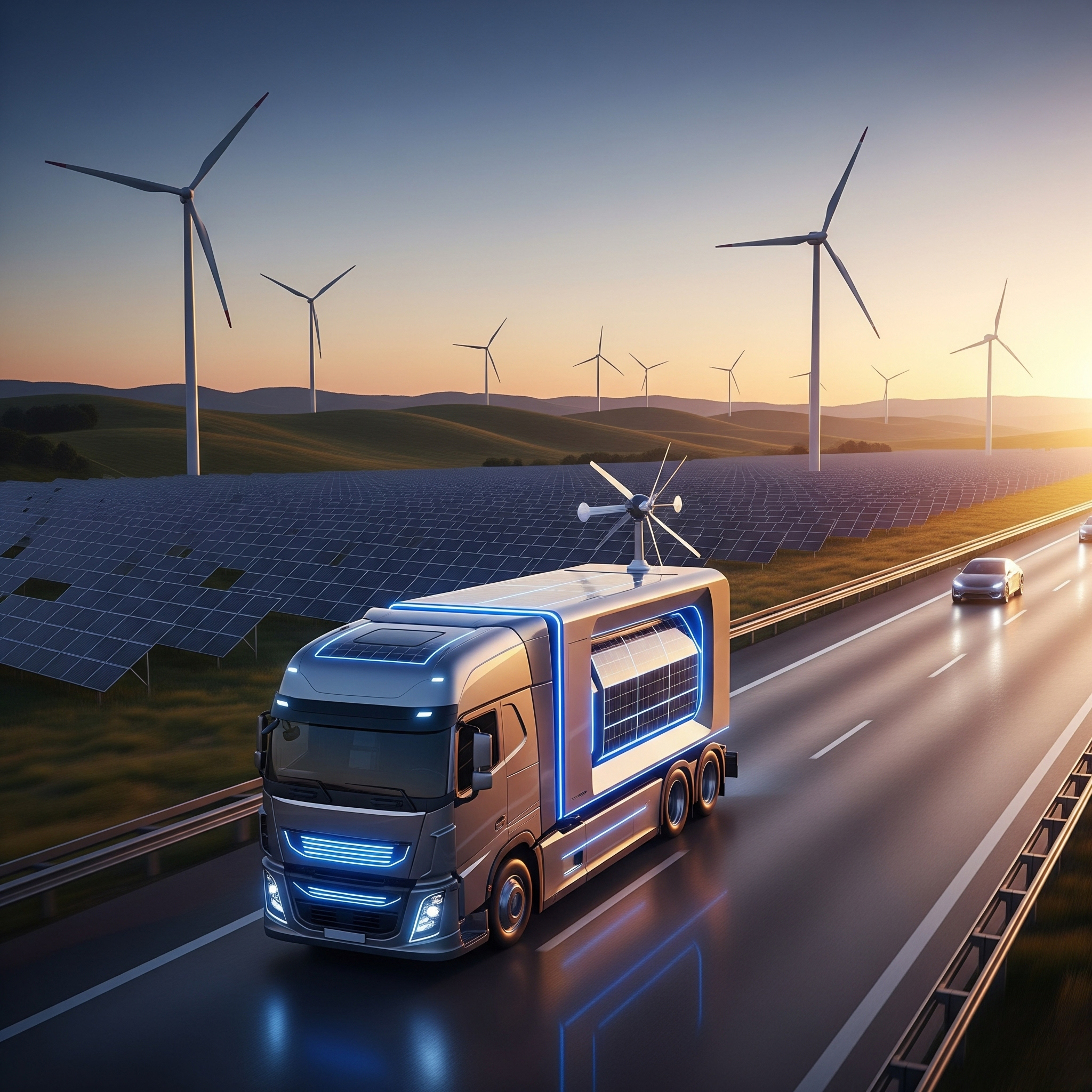Fueling the Future: Alternative Energy in the Trucking Industry
September 23, 2025
Discover how alternative energy is revolutionising the trucking industry. Learn about electric trucks, hydrogen fuel cells, renewable natural gas, and biofuels driving a cleaner, more profitable future in freight transportation.

The trucking industry powers the backbone of global commerce, moving billions of tons of goods every year. But as fuel costs climb and environmental concerns take center stage, the demand for cleaner, more efficient energy solutions has never been higher. Alternative energy in trucking is no longer a distant dream—it’s the road ahead. From electric semis to hydrogen-powered fleets, the industry is shifting gears toward a greener, more sustainable future.
In this blog, we’ll explore the key alternative energy options transforming trucking, the benefits they bring, and what carriers, shippers, and fleet owners can do to stay ahead of the curve.
Why Alternative Energy Matters in Trucking
Trucking remains a critical driver of the economy, but it comes with significant environmental challenges. According to the U.S. Environmental Protection Agency (EPA), the transportation sector accounts for nearly 29% of total greenhouse gas (GHG) emissions in the United States, with heavy-duty trucks representing a major share of those emissions.
The push toward alternative energy is fueled by three main factors:
-
Environmental Regulations: Governments across the world are tightening emissions standards, incentivizing clean energy adoption.
-
Rising Fuel Costs: Volatile diesel prices impact profitability for carriers and shippers alike.
-
Corporate Sustainability Goals: More companies are committing to carbon-neutral supply chains to meet customer and investor expectations.
Alternative energy is not just about reducing carbon footprints—it’s about staying competitive in a rapidly evolving market.
Key Alternative Energy Solutions in Trucking
1. Electric Trucks (Battery Electric Vehicles – BEVs)
Electric trucks are leading the charge in the shift to clean energy. Industry giants like Tesla, Volvo, and Freightliner are rolling out battery-powered Class 8 trucks capable of long-haul operations.
Advantages:
-
Zero tailpipe emissions
-
Lower maintenance costs (fewer moving parts)
-
Quiet operation, reducing urban noise pollution
Challenges:
-
Limited charging infrastructure in remote areas
-
Higher upfront costs compared to diesel trucks
-
Battery weight and range limitations for heavy cargo
Despite these hurdles, advancements in fast-charging technology and battery capacity are making electric trucks a viable option for regional and urban freight.
2. Hydrogen Fuel Cell Trucks
Hydrogen fuel cell technology offers an exciting alternative to both diesel and battery-electric vehicles. Trucks powered by hydrogen fuel cells generate electricity on board by combining hydrogen and oxygen, emitting only water vapor as a byproduct.
Advantages:
-
Longer range than battery-electric trucks
-
Faster refueling times (similar to diesel)
-
Lightweight energy storage compared to large battery packs
Challenges:
-
Limited hydrogen refueling infrastructure
-
High production costs for green hydrogen
-
Safety and storage concerns
Major players like Toyota, Nikola, and Hyundai are investing heavily in hydrogen-powered fleets, signaling strong industry confidence in this technology.
3. Renewable Natural Gas (RNG)
Renewable natural gas, derived from organic waste materials such as landfills and agricultural residues, is another promising solution. Trucks powered by compressed natural gas (CNG) or liquefied natural gas (LNG) can operate with significantly lower emissions than diesel.
Advantages:
-
Lower carbon footprint compared to fossil fuels
-
Well-developed refueling infrastructure in some regions
-
Cost-effective compared to diesel
Challenges:
-
Still reliant on combustion engines
-
Limited supply of renewable feedstock
RNG serves as a transitional fuel, helping fleets reduce emissions while infrastructure for electric and hydrogen vehicles matures.
4. Biofuels (Biodiesel & Renewable Diesel)
Biofuels are drop-in replacements for traditional diesel, meaning fleets can use them without major engine modifications. Produced from renewable resources like vegetable oils and animal fats, biodiesel and renewable diesel can significantly reduce GHG emissions.
Advantages:
-
Compatibility with existing diesel engines
-
Lower lifecycle carbon emissions
-
Widely available in many markets
Challenges:
-
Feedstock availability and competition with food production
-
Slightly lower energy content compared to diesel
Biofuels are a practical, cost-effective option for fleets seeking immediate emission reductions without major infrastructure changes.
Benefits of Alternative Energy in Trucking
Adopting alternative energy solutions delivers advantages far beyond sustainability:
-
Cost Savings: Lower fuel and maintenance expenses over the vehicle’s lifecycle.
-
Regulatory Compliance: Meet or exceed emissions standards, avoiding fines or penalties.
-
Brand Value: Strengthen reputation with eco-conscious customers and partners.
-
Market Advantage: Early adopters can gain access to incentives, subsidies, and premium contracts with shippers demanding greener supply chains.
Challenges on the Road to Adoption
Despite its potential, the road to alternative energy adoption isn’t without bumps:
-
Infrastructure Gaps: Charging stations, hydrogen refueling sites, and RNG supply chains need rapid expansion.
-
High Upfront Costs: Electric and hydrogen trucks remain more expensive than diesel counterparts.
-
Technological Limitations: Battery range, refueling logistics, and fuel availability must improve for widespread deployment.
However, these challenges are steadily being addressed as governments, manufacturers, and logistics companies invest heavily in clean transportation solutions.
Preparing for a Cleaner Future
For carriers, shippers, and fleet operators, the transition to alternative energy is no longer a question of if—it’s a matter of when. Here’s how to get started:
-
Evaluate Routes & Operations: Determine whether electric, hydrogen, or RNG fits best with your freight patterns.
-
Tap Into Incentives: Explore federal and state grants, tax credits, and subsidies for clean energy investments.
-
Partner with Innovators: Collaborate with OEMs, energy providers, and logistics tech companies to stay ahead of industry trends.
Final Thoughts
The trucking industry is entering a transformative era where alternative energy isn’t just about environmental responsibility—it’s a smart business strategy. Electric, hydrogen, RNG, and biofuel technologies each offer unique advantages, and early adopters stand to benefit from cost savings, brand differentiation, and long-term competitiveness.
As technology improves and infrastructure expands, the future of trucking is clear: cleaner, greener, and powered by innovation.